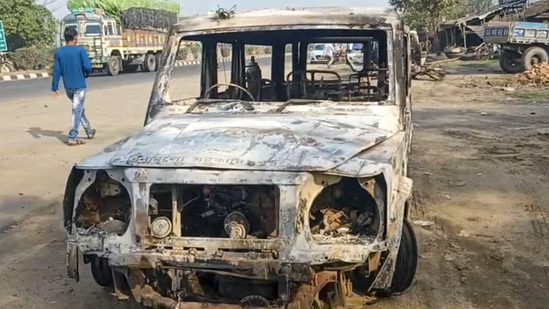Murshidabad district of West Bengal has been tense amid violent clashes that erupted following protests over the Waqf Act. Three deaths have been reported in Waqf-related violence at Samserganj in West Bengal’s Murshidabad, shortly after which the Calcutta high court ordered the deployment of the central forces in the clash-hit district.
A special bench comprising Justices Soumen Sen and Raja Basu Chowdhury was constituted by the Chief Justice to urgently hear a petition filed by Suvendu Adhikari, Leader of the Opposition in the West Bengal Assembly, seeking the deployment of central forces in the district. Stating that it cannot keep its eyes closed when such situations come up, the Calcutta high court on Saturday ordered deployment of Central Armed Police Forces (CAPF) in Murshidabad.
The court said citizens must be provided with adequate security and protection to ensure peace and order in the region. The court also instructed both the state government and the Centre to submit detailed reports on the situation. The matter is scheduled for further hearing on April 17. Murshidabad district of West Bengal has been tense amid violent clashes that erupted following protests over the Waqf Act, prompting chief minister to say that the legislation will not be implemented in the state after accusations by the opposition Bharatiya Janata Party (BJP) at her of inaction over the stir.
So far, 118 people have been arrested in connection with the violence that broke out in the district on Friday, according to police. Taking to microblogging platform X amid fresh violence from Murshidabad’s Dhulian on Saturday, Mamata Banerjee said, “Remember, we did not make the law over which many are agitated. The law was made by the central government. So the answer you want should be sought from the central government.”
“We have made our position clear on this matter — we do not support this law. This law will not be implemented in our state. So what is the riot about,” Mamata Banerjee asked in her post.
Murshidabad violence: How it started
Protests against the Waqf Act rocked parts of West Bengal on Friday, with agitators setting ablaze vehicles, disrupted vehicular and rail movement. A few policemen suffered injuries while trying to control the mob, officials said. The demonstrations took a violent turn in Suti in Murshidabad district when the protesters assembled despite prohibitory orders and blocked roads, hurled stones at security personnel, torched police vans and public buses during processions.
According to a senior police officer cited in the report, tensions started when Muslims gathered after Friday prayers and staged protests against the Waqf Act, blocking a stretch of National Highway-12 from Dakbanglo More in Shamsherganj to Sutir Sajur More. “The protests turned violent after the agitators hurled stones at a police van, resulting in a clash in which around 10 policemen were injured,” he said.
Police had to lathi-charge to bring the “unruly mob” under control, and later resorted to using tear gas shells when some protesters threw bomb-like substances at them, the officer said. Some police personnel were compelled to take shelter in a nearby mosque amid the violence, as the district administration requested the BSF to intervene to restore normalcy, another officer said. The violent protests on Saturday spilled over to Dhulian in Murshidabad’s Samserganj , where one person sustained a bullet injury West Bengal BJP president Sukanta Majumdar demanded that the TMC government strictly enforces the rule of law in Murshidabad.
Asserting that when the BJP comes to power in West Bengal, “such vandalism by a section of minorities will be crushed in five minutes”, Majumdar alleged that the “appeasement-driven state administration was not taking appropriate steps”.



